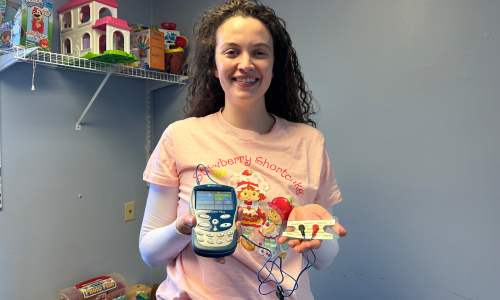VitalStim Therapy for Dysphasia Now Offered at the Schreiber Center
February 15, 2024We’re delighted to announce that with the addition of Ashley Shaffer to our speech-language department we are now able to offer VitalStim therapy for kids with swallowing disorders. Ashley is the first of our speech-language pathologists to become certified in this revolutionary non-invasive therapy that uses electrical currents to stimulate the throat muscles for proper and safe swallowing. As the only FDA approved device for the treatment of dysphagia, or difficulty swallowing, we are thrilled to add this treatment option to our arsenal.

Of course, even with a speech-language pathologist who was certified in this therapy technique, without the necessary equipment we would not be able to offer this life-changing therapy to our Schreiber kids. Thankfully in October of 2023, we received $13,050 from the GIANT Company through their Make a Difference Challenge, which has allowed us to purchase the VitalStim Plus Electrotherapy and SEMG Biofeedback System and VitalStim Electrodes. With access to this state-of-the-art equipment, we no longer have to turn children who need this specialized therapy service away or refer them to other healthcare providers to receive the care they need.

The most common difficulties related to feeding seen at Schreiber are children with difficulties related to the oral stage of swallowing. But now that we offer VitalStim therapy at the Schreiber Center as an option to clients struggling in the pharyngeal phase of swallowing, we expect to be able to serve even more children with feeding challenges.
Many of us consider swallowing to be an automatic reflex but medically it’s a complex action involving roughly 50 pairs of muscles and nerves that require coordination in a 3-stage process to move food or liquid from the mouth to the stomach. The first of these three stages is the oral phase which includes gathering food in the mouth and chewing. Dysphasia in this phase may cause difficulty chewing or manipulating the food in the mouth. Traditional feeding therapies are most effective with oral phase dysphasia.
The second stage is the pharyngeal phase which is the first stage of swallowing where the food begins to move from the mouth through the pharynx, during which time the airway must be protected to avoid food or liquid entering the airway. Dysphasia in this phase involves difficulty coordinating these muscle movements leading to difficulties in clearing the airway and moving the food to the esophagus. This is the phase where VitalStim therapy for dysphasia is most helpful, as it improves the coordination and strength of the muscles involved in this phase.
The third stage of moving food or liquid from the mouth to the stomach is called the esophageal phase and is the final phase where the food is transported through the esophagus and into the stomach. Dysphagia in this phase can be caused by a narrowing in the esophagus or poor muscle coordination in the esophagus. Dysphasia in this phase often requires dilation procedures, medication or in some cases surgical intervention.
There are several reasons why a child might need feeding therapy including: children with neuromuscular disorders who experience weakness of the throat muscles, children with congenital conditions such as cleft palates, children with developmental delays that may affect their ability or willingness to swallow various textures or liquids, and of course children who have undergone surgery or have experienced an injury which effects the muscles involved in swallowing. In each of these situations the children who need it will now be able to benefit from the use of VitalStim therapy in their sessions. This marks a significant leap forward in our mission to provide the best possible care for every child that enters our doors.
Author’s Note:
The valuable insights and information shared in this article were provided by the Schreiber Center for Pediatric Development’s pediatric speech-language pathologist Ashley Shaffer. Her extensive knowledge and experience has been essential in shaping the content of this piece.
Contribute to the Kids’ Care Fund now to ensure that children in need, both present and future, receive these essential services regardless of their family’s financial situation.
As a nationally recognized pediatric facility, the Schreiber Center for Pediatric Development provides family-centered education and therapy programs for infants, children and adolescents with disabilities, developmental delays, and acquired injuries. Our goal-oriented approach maximizes each child’s ability to function independently within the community.